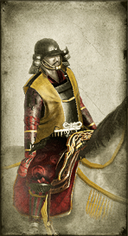
Basic Unit Statistics (can be modified by difficulty level, arts, skills, traits and retainers)
| Recruitment Cost | 270 | |
| Upkeep Cost | 90 | |
| Melee Attack | 14 | 40% |
| Charge Bonus | 15 | 30% |
| Bonus vs Cavalry | 0 | 0% |
| Melee Defence | 8 | 22% |
| Armour | 5 | 33% |
| Morale | 12 | 24% |
Strengths & Weaknesses
- General provides morale bonus to nearby units.
- Many powerful special abilities.
- Very good in melee.
- Weak against missile attacks and spear units.
- Very good morale.
Abilities
- Inspire Unit - This unit can choose to inspire a single unit for a short period of time, boosting their morale and greatly improving their marksmanship and melee skills.
- Rally - This unit can rally troops within his area of influence.
- Regroup Position - This general can declare a rally position for withdrawing and routing units to pull back to, and reinforcing units to move towards.
- Stand and Fight - The general dismounts and forms up with his bodyguard around him. All friendly units within a large area have their melee attack, firing rate and morale greatly increased, but the general himself is left immobile and vulnerable until the ability is deactivated.
Description
It is a general's duty to lead, and a bodyguard's duty to die for his general.
It is a terrible temptation for all generals to become involved in the fighting, but this is not their first duty in battle. It is their task to inspire, setting an example in courage, but most importantly supporting and encouraging their men to greater efforts. To this end, generals provide a morale bonus to all nearby friendly units, and it is this that makes them far more useful than just being a good close combat unit. As might be expected, generals and their entourages have very good morale and are unlikely to run in battle. They are not invincible, however, and can be shot down like other men; they are also likely to take casualties if pitched in against yari-armed troops. The traditional forms of command are a good way of getting killed on a 19th Century battlefield because a bullet or shell inconveniently ignores personal bravery when it arrives. The man who leads from the front without considering the bigger picture will only be the first man killed, not a good general. This, however, almost seems a complete negation of the spirit of bushido, of being a warrior. Good commanders were the ones who learned that there was a deeper truth in not being killed in a futile fashion, no matter what traditional honour might have dictated.